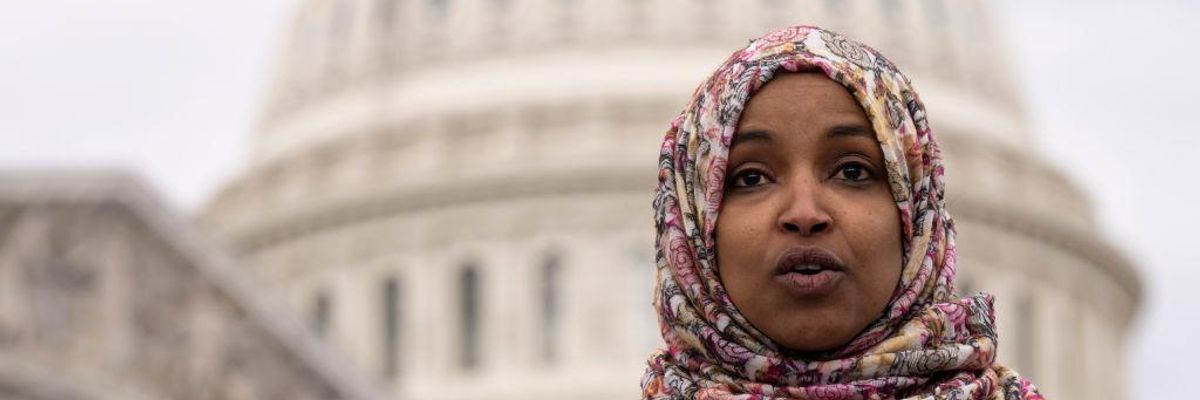
'I Don't Like Censorship': Omar Slams Proposed TikTok Ban as Hawley Aims to Fast-Track Passage
"There are very legitimate concerns about privacy and the harvesting of private user data on social media platforms, but this proposal doesn't address those," said the Minnesota Democrat.
Democratic Rep. Ilhan Omar on Tuesday joined the ranks of progressive lawmakers and advocacy groups voicing opposition to proposals to ban TikTok as Republican Sen. Josh Hawley plans to force a vote on his bill sometime this week.
"I am opposed to efforts by some Republicans and Democrats to unilaterally ban an entire social media platform," Omar (Minn.) said in a statement.
"First of all, I don't like censorship," said Omar. "There are very legitimate concerns about privacy and the harvesting of private user data on social media platforms, but this proposal doesn't address those. Instead, it singles out one platform—TikTok—and bans it outright."
Amid a rise in what Rep. Jamaal Bowman (D-N.Y.) has called "xenophobic anti-China rhetoric," U.S. lawmakers have introduced three pieces of legislation that would crack down on TikTok, which is owned by Beijing-based ByteDance.
Rep. Michael McCaul's (R-Texas) DATA Act, which passed the House Foreign Affairs Committee earlier this year, would require the White House to sanction companies that are "subject to the jurisdiction" of China and "believed to have facilitated" the transfer of sensitive personal data.
The RESTRICT Act, introduced by Sens. Mark Warner (D-Va.) and John Thune (R-S.D.), would authorize the U.S. Commerce Department to "review and prohibit certain transactions between persons in the United States and foreign adversaries," which could trigger a TikTok ban or sale.
Hawley's (Mo.) No TikTok on United States Devices Act, meanwhile, seeks to outlaw TikTok use nationwide.
The far-right lawmaker "plans to seek unanimous consent on the floor this week" to pass his bill, Punchbowl News reported Tuesday. Hawley said that "this is the moment to act" after last week's "unbelievable" hearing, during which TikTok CEO Shou Zi Chew was accosted by members of the House Energy and Commerce Committee.
According to the outlet, Warner and Thune may put forth their competing bill, in which case there's a chance of neither passing the Senate before the Easter recess.
"We should create actual standards and regulations around data harvesting and privacy violations across social media companies—like many countries around the world have already done—not ban particular platforms we don't like."
"Aside from raising legitimate First Amendment concerns, this is bad policy," Omar said Tuesday. "We should create actual standards and regulations around data harvesting and privacy violations across social media companies—like many countries around the world have already done—not ban particular platforms we don't like."
With this line of criticism, Omar echoed Bowman and Rep. Alexandria Ocasio-Cortez (D-N.Y.), whose inaugural TikTok video on Saturday endorsed arguments made last month by defenders of digital rights and civil liberties.
Fight for the Future director Evan Greer, for instance, said in February that if members of Congress truly want to protect U.S. residents from the surveillance capitalist business model also embraced by domestic Big Tech firms, "they should advocate for strong data privacy laws that prevent all companies (including TikTok!) from collecting so much sensitive data about us in the first place, rather than engaging in what amounts to xenophobic showboating that does exactly nothing to protect anyone."
For her part, Omar stressed that "as a frequent target of disinformation campaigns, I am sympathetic to... concerns that TikTok could be used for propaganda and hate speech."
"But again, this problem is not unique to TikTok," the lawmaker continued. "Twitter, Instagram, and famously, Facebook have all been used by foreign adversaries for disinformation campaigns targeting U.S. citizens. Our regulations should address these broad issues instead of singling out one platform."
"Lastly, there are legitimate concerns about the Chinese government—including their brutal repression of the Uyghur people and their suppression of basic rights of freedom of expression in their country," said Omar. "But banning one social media company based in China will not solve those problems."
"The American model rests on our protection of those freedoms—the ability to speak publicly against the government, or if you choose, to share a 10-second video cooking your favorite meal," she added. "That is the beauty of our democracy and our constitution. That is what sets us apart from authoritarian regimes like China. And that is the example we should set for the world."
An Urgent Message From Our Co-Founder
Dear Common Dreams reader, The U.S. is on a fast track to authoritarianism like nothing I've ever seen. Meanwhile, corporate news outlets are utterly capitulating to Trump, twisting their coverage to avoid drawing his ire while lining up to stuff cash in his pockets. That's why I believe that Common Dreams is doing the best and most consequential reporting that we've ever done. Our small but mighty team is a progressive reporting powerhouse, covering the news every day that the corporate media never will. Our mission has always been simple: To inform. To inspire. And to ignite change for the common good. Now here's the key piece that I want all our readers to understand: None of this would be possible without your financial support. That's not just some fundraising cliche. It's the absolute and literal truth. We don't accept corporate advertising and never will. We don't have a paywall because we don't think people should be blocked from critical news based on their ability to pay. Everything we do is funded by the donations of readers like you. Will you donate now to help power the nonprofit, independent reporting of Common Dreams? Thank you for being a vital member of our community. Together, we can keep independent journalism alive when it’s needed most. - Craig Brown, Co-founder |
Democratic Rep. Ilhan Omar on Tuesday joined the ranks of progressive lawmakers and advocacy groups voicing opposition to proposals to ban TikTok as Republican Sen. Josh Hawley plans to force a vote on his bill sometime this week.
"I am opposed to efforts by some Republicans and Democrats to unilaterally ban an entire social media platform," Omar (Minn.) said in a statement.
"First of all, I don't like censorship," said Omar. "There are very legitimate concerns about privacy and the harvesting of private user data on social media platforms, but this proposal doesn't address those. Instead, it singles out one platform—TikTok—and bans it outright."
Amid a rise in what Rep. Jamaal Bowman (D-N.Y.) has called "xenophobic anti-China rhetoric," U.S. lawmakers have introduced three pieces of legislation that would crack down on TikTok, which is owned by Beijing-based ByteDance.
Rep. Michael McCaul's (R-Texas) DATA Act, which passed the House Foreign Affairs Committee earlier this year, would require the White House to sanction companies that are "subject to the jurisdiction" of China and "believed to have facilitated" the transfer of sensitive personal data.
The RESTRICT Act, introduced by Sens. Mark Warner (D-Va.) and John Thune (R-S.D.), would authorize the U.S. Commerce Department to "review and prohibit certain transactions between persons in the United States and foreign adversaries," which could trigger a TikTok ban or sale.
Hawley's (Mo.) No TikTok on United States Devices Act, meanwhile, seeks to outlaw TikTok use nationwide.
The far-right lawmaker "plans to seek unanimous consent on the floor this week" to pass his bill, Punchbowl News reported Tuesday. Hawley said that "this is the moment to act" after last week's "unbelievable" hearing, during which TikTok CEO Shou Zi Chew was accosted by members of the House Energy and Commerce Committee.
According to the outlet, Warner and Thune may put forth their competing bill, in which case there's a chance of neither passing the Senate before the Easter recess.
"We should create actual standards and regulations around data harvesting and privacy violations across social media companies—like many countries around the world have already done—not ban particular platforms we don't like."
"Aside from raising legitimate First Amendment concerns, this is bad policy," Omar said Tuesday. "We should create actual standards and regulations around data harvesting and privacy violations across social media companies—like many countries around the world have already done—not ban particular platforms we don't like."
With this line of criticism, Omar echoed Bowman and Rep. Alexandria Ocasio-Cortez (D-N.Y.), whose inaugural TikTok video on Saturday endorsed arguments made last month by defenders of digital rights and civil liberties.
Fight for the Future director Evan Greer, for instance, said in February that if members of Congress truly want to protect U.S. residents from the surveillance capitalist business model also embraced by domestic Big Tech firms, "they should advocate for strong data privacy laws that prevent all companies (including TikTok!) from collecting so much sensitive data about us in the first place, rather than engaging in what amounts to xenophobic showboating that does exactly nothing to protect anyone."
For her part, Omar stressed that "as a frequent target of disinformation campaigns, I am sympathetic to... concerns that TikTok could be used for propaganda and hate speech."
"But again, this problem is not unique to TikTok," the lawmaker continued. "Twitter, Instagram, and famously, Facebook have all been used by foreign adversaries for disinformation campaigns targeting U.S. citizens. Our regulations should address these broad issues instead of singling out one platform."
"Lastly, there are legitimate concerns about the Chinese government—including their brutal repression of the Uyghur people and their suppression of basic rights of freedom of expression in their country," said Omar. "But banning one social media company based in China will not solve those problems."
"The American model rests on our protection of those freedoms—the ability to speak publicly against the government, or if you choose, to share a 10-second video cooking your favorite meal," she added. "That is the beauty of our democracy and our constitution. That is what sets us apart from authoritarian regimes like China. And that is the example we should set for the world."
- Calling Out 'Hypocrisy and Censorship,' Campaign Aims to Prevent US TikTok Ban ›
- US Progressives Stand Against 'Xenophobic' TikTok Ban ›
- In First TikTok, AOC Says Solution Is Not Ban But Strong Privacy Laws ›
- 'Blatant Censorship': Critics Blast US House Vote for TikTok Ban ›
Democratic Rep. Ilhan Omar on Tuesday joined the ranks of progressive lawmakers and advocacy groups voicing opposition to proposals to ban TikTok as Republican Sen. Josh Hawley plans to force a vote on his bill sometime this week.
"I am opposed to efforts by some Republicans and Democrats to unilaterally ban an entire social media platform," Omar (Minn.) said in a statement.
"First of all, I don't like censorship," said Omar. "There are very legitimate concerns about privacy and the harvesting of private user data on social media platforms, but this proposal doesn't address those. Instead, it singles out one platform—TikTok—and bans it outright."
Amid a rise in what Rep. Jamaal Bowman (D-N.Y.) has called "xenophobic anti-China rhetoric," U.S. lawmakers have introduced three pieces of legislation that would crack down on TikTok, which is owned by Beijing-based ByteDance.
Rep. Michael McCaul's (R-Texas) DATA Act, which passed the House Foreign Affairs Committee earlier this year, would require the White House to sanction companies that are "subject to the jurisdiction" of China and "believed to have facilitated" the transfer of sensitive personal data.
The RESTRICT Act, introduced by Sens. Mark Warner (D-Va.) and John Thune (R-S.D.), would authorize the U.S. Commerce Department to "review and prohibit certain transactions between persons in the United States and foreign adversaries," which could trigger a TikTok ban or sale.
Hawley's (Mo.) No TikTok on United States Devices Act, meanwhile, seeks to outlaw TikTok use nationwide.
The far-right lawmaker "plans to seek unanimous consent on the floor this week" to pass his bill, Punchbowl News reported Tuesday. Hawley said that "this is the moment to act" after last week's "unbelievable" hearing, during which TikTok CEO Shou Zi Chew was accosted by members of the House Energy and Commerce Committee.
According to the outlet, Warner and Thune may put forth their competing bill, in which case there's a chance of neither passing the Senate before the Easter recess.
"We should create actual standards and regulations around data harvesting and privacy violations across social media companies—like many countries around the world have already done—not ban particular platforms we don't like."
"Aside from raising legitimate First Amendment concerns, this is bad policy," Omar said Tuesday. "We should create actual standards and regulations around data harvesting and privacy violations across social media companies—like many countries around the world have already done—not ban particular platforms we don't like."
With this line of criticism, Omar echoed Bowman and Rep. Alexandria Ocasio-Cortez (D-N.Y.), whose inaugural TikTok video on Saturday endorsed arguments made last month by defenders of digital rights and civil liberties.
Fight for the Future director Evan Greer, for instance, said in February that if members of Congress truly want to protect U.S. residents from the surveillance capitalist business model also embraced by domestic Big Tech firms, "they should advocate for strong data privacy laws that prevent all companies (including TikTok!) from collecting so much sensitive data about us in the first place, rather than engaging in what amounts to xenophobic showboating that does exactly nothing to protect anyone."
For her part, Omar stressed that "as a frequent target of disinformation campaigns, I am sympathetic to... concerns that TikTok could be used for propaganda and hate speech."
"But again, this problem is not unique to TikTok," the lawmaker continued. "Twitter, Instagram, and famously, Facebook have all been used by foreign adversaries for disinformation campaigns targeting U.S. citizens. Our regulations should address these broad issues instead of singling out one platform."
"Lastly, there are legitimate concerns about the Chinese government—including their brutal repression of the Uyghur people and their suppression of basic rights of freedom of expression in their country," said Omar. "But banning one social media company based in China will not solve those problems."
"The American model rests on our protection of those freedoms—the ability to speak publicly against the government, or if you choose, to share a 10-second video cooking your favorite meal," she added. "That is the beauty of our democracy and our constitution. That is what sets us apart from authoritarian regimes like China. And that is the example we should set for the world."
- Calling Out 'Hypocrisy and Censorship,' Campaign Aims to Prevent US TikTok Ban ›
- US Progressives Stand Against 'Xenophobic' TikTok Ban ›
- In First TikTok, AOC Says Solution Is Not Ban But Strong Privacy Laws ›
- 'Blatant Censorship': Critics Blast US House Vote for TikTok Ban ›

